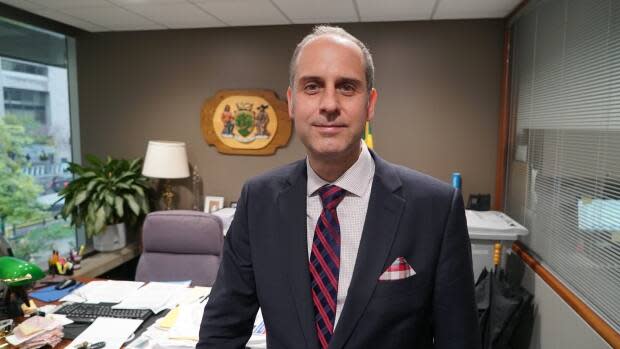City taking province to court over bill critics say will make evictions too easy for landlords
Toronto city council has waded into the debate over the province's controversial Bill 184 — a new law that critics say makes it too easy for landlords to evict tenants who've fallen behind in their rent.
Council voted Thursday to launch a legal challenge against the bill. They say its provisions will impede the right of tenants to a full and fair hearing at the Landlord and Tenant Board, a provincial tribunal that hears disputes between renters and landlords.
That, combined with the lifting of a provincial moratorium on evictions, will lead to overwhelming homelessness, according to Coun. Gord Perks, who authored the motion calling for a court challenge.
"That problem — that horrible problem, which we can see on our streets in the form of encampments and people sleeping rough on sidewalks — will balloon out of any proportion that we have ever experienced in the city of Toronto," he said.
Perk's motion passed by a vote of 22 to 2.

Councillors maintained that more than 3,000 pending evictions were paused by the province's moratorium.
Geordie Dent, executive director of the Federation of Metro Tenants' Associations, warned Bill 184 will handcuff the most vulnerable tenants who've fallen behind in their rent payments, and who are often unsure of their legal rights.
"I can't imagine that, during a global pandemic, what you try to do is throw grandma and grandpa into the streets as fast as possible," he said. "It doesn't make any sense from either a moral or public health standpoint."
Dent and other tenants' advocates maintain that, while currently all disputes over evictions and rent in arrears must be heard by the Landlord and Tenant Board — some of which result in rent repayment plans — the bill would allow landlords to bypass the board, offer tenants their own repayment plan and in many cases speed up the eviction process.
However, the government of Premier Doug ford says the legislation will "strengthen protections for tenants and make it easier to resolve landlord and tenant disputes."
An official with the Ministry of Municipal Affairs and Housing has previously explained in an email to CBC News that if an agreement is reached between the landlord and tenant, it must still be submitted to the board for approval, and if approved, the board would then issue a consent order.
The official explained that after a consent order is issued, a tenant has 30 days to appeal the order if they feel they were pressured into the agreement. And if a tenant is offered a repayment plan, they still have a right to a hearing.

Coun. Stephen Holyday, who voted against Perks's motion, argued that during an acute housing shortage, the city should not be discouraging people from becoming landlords.
"Who wants to get into the business of landlords? I think the city could do a lot to help small landlords come forward and solve some of the housing issues in this city," he said.
"And one of those major pieces is getting a reasonable, fair, equitable, efficient regulatory framework that both protects tenants and protects landlords."
He also questioned the expense involved in the challenge: "This is another example of using taxpayers money to fight taxpayers money," he said. "I wish we would just pay attention to the immediate needs of the city, rather than taking on larger political fights."
Mayor John Tory voted in favour of the challenge, despite his belief that it's by no means a slam dunk that the city will win.
"It's an uphill struggle because the law, the Constitution, the way those legal and constitutional responsibilities are divided up, it argues strongly against us," he said.
"But you can't win if you don't try."

